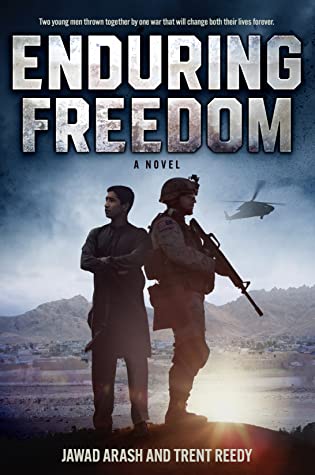Enduring Freedom
Genre: war

Author: Jawad Arash and Trent Reedy
Publisher: Algonquin Young Readers
On the night of September 11th, 2001, Baheer sees his family’s life instantly turned upside down when they lose their livelihood as war rocks the country. In Iowa, college freshman Joe is shipped off to Afghanistan with preconceived notions of the people he is tasked to help. When Joe and his fellow soldiers end up living next to Baheer’s family, the two are immediately wary of each other, but over time, the young men start to see one another as individuals and realize they have a lot more in common than they ever could have imagined. Will they be able to get past the deep differences in their experiences and beliefs to become true friends and allies?
left no-repeat;left top;; autoI have generally stayed away from war books after my own combat experiences in what became known as Operation Iraqi Freedom (an offshoot of the larger, longer “Operation Enduring Freedom” described in this book), as they tend either to be too triggering of my negative experiences, or too oversimplified to truly capture the nuance and complexities of war, especially the “global war on terror."
However, when this book came across my desk, the two-pronged story struck me with its potential to “tell the truth” in ways so many other books can’t. It absolutely lived up to that. The authors themselves discuss this goal in a postscript, and I appreciated the book’s themes and its parallel views of a war that has lasted longer than the lifespan of most of the book’s target audience.
Certainly, I was drawn in initially by the extremely true-to-life experiences of PFC Joe Killian, as his thoughts on 9/11 and his subsequent life changes – being thrown from college life into combat – almost exactly matched my own. But even without that, having Baheer’s story told alongside Joe’s gives this book a gravitas and a maturity that both adds to Joe’s own experiences but also challenges our many preconceived notions of the war, the US’s mission, the horrors of the Taliban and the multiple perspectives of the local Afghans. The war itself has almost entirely vanished from our news cycle, and it was important to recognize – for all the questions of whether we truly accomplished our missions – that the Taliban was absolutely horrific. Baheer’s side of things truly humanizes the rest of the Afghans while shedding not a single tear for the talibs (religious students). And while we no longer wring our hands over fighting in Afghanistan, the Afghans' work continues in building their country anew.
The authors deftly develop the main protagonists, though the book jacket may be a little misleading in implying that the main tension is about building a friendship – they are friends for most of the book, and despite a pivotal disagreement, the antagonism they face is not each other but their differing hopes, dreams, risks and lessons. In this, they both face a coming of age that forms each one into a man who can lead his generation in ways their predecessors did not.
The development of side characters is also incredibly well done in parts, especially with the local Afghans, Baheer’s family being the majority of these. From the bravery of Baheer’s sister, to the skepticism of his brother, to the challenging decisions his grandfather must make, we get far more of a picture of how Afghans must face these decisions much more than Americans – and how the way forward is in education and determination.
If the book has weaknesses, they may come in the form of a few contrived threads that wrap up a little too neatly; the book is so real, that happy endings or dramatic moments that could be fictional feel almost too fictional. Still, this is hardly anything to worry about when considering the many areas where this book knocks it out of the park. I will say that any combat veterans of Afghanistan or Iraq should be prepared for a handful of truly intense combat moments, and parents should consider whether these scenes will be too intense for younger readers (e.g. exploding bodies, civilian and child casualties, etc.). My heart raced enough to keep me up late reading more until I could get to sleep, but that also led to my finishing the book much faster.
Indeed, in what amounts to a novelized joint memoir, Reedy and Arash not only create a unique and valuable look at this war – as fraught with politicization, tactical quagmires and decades of coverage as it has been – but also point us to the importance of not limiting ourselves to a “single story,” recognizing that telling the truth can never be fully true unless it is as complete as possible. With the audacious title Enduring Freedom, co-opting the US operation’s name, this story demonstrates that it has always been books and boldness, not bombs and bullets, which ultimately help freedom endure.
- J.G.
left no-repeat;left top;; auto
